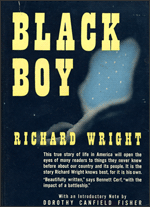Radical Novels

Black Boy: A Record of Childhood and
Youth.
Richard Wright.
New York: Harper & Brothers Publishers, 1945.
Such black writers as Dunbar and Chesnutt had been largely forgotten, and the recent Harlem Renaissance had Twenties' affiliations that were unfashionable. Wright, whose poverty-stricken boyhood in Mississippi is unsparingly detailed in his autobiography, Black Boy (1944), found the proletarian spirit of the 1930s completely congenial, a natural outlet for writing about the black experience. Wrightís first published book, Uncle Tom's Children (1938), a collection of four novellas dealing with black oppression in the South, received glowing reviews (a notable exception being Zora Neale Hurston's in the Saturday Review of Literature) and Story magazine's prize for the best book-length manuscript submitted by anyone connected with the Federal Writer's Project. It was, however, Native Son which gained national and international acclaim. Writing in The Spectator, Rosamond Lehmann expressed the conclusions of most readers: "To me the scope and passionate sincerity of the book give it a grandeur, a moral importance at least as good as that of An American Tragedy".